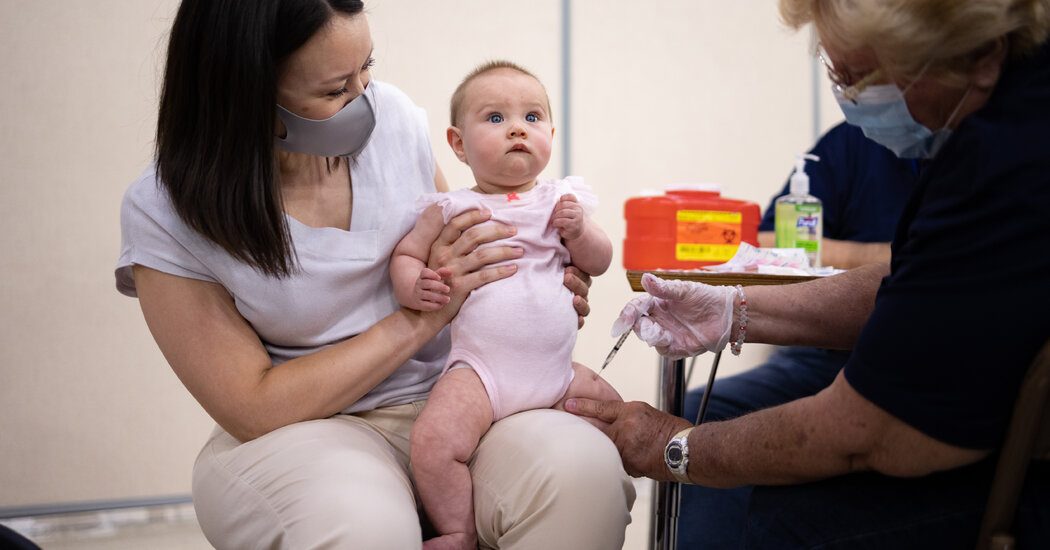Just a month after the Food and Drug Administration approved Covid-19 vaccines for very young children, the prognosis that large numbers of them will actually get the injections looks bleak, according to a new survey of parents released Tuesday by the Kaiser Family. Foundation has been released. who have followed vaccine attitudes throughout the pandemic.
A majority of parents surveyed said they viewed the vaccine as a greater risk to their children than the coronavirus itself.
For children aged 6 months to 4 years, parental fears have so far led to the administration of barely a trickle of Covid injections. As of June 18, when they qualified, only 2.8 percent of those children had received injections, the foundation recently found in a separate analysis of federal vaccine data. In comparison, 18.5 percent of children ages 5 to 11, who have been eligible for Covid shots since October, had been vaccinated at a similar time in their shot rollout.
The new survey found that 43 percent of parents with children under the age of 5 said they would “definitely not get them vaccinated.” About 27 percent said they would “wait and see,” while another 13 percent said they would have their children vaccinated “only if necessary.” Even some parents who had been vaccinated against Covid themselves said they would not consent to their youngest children.
The new analysis of parental views comes because vaccine uptake for older children has slowed significantly. To date, only 40 percent of children ages 5 to 11 have been vaccinated. In the new survey, 37 percent of parents said they would receive “absolutely no” Covid vaccine for their child in that age group.
The parents’ main concerns were about possible side effects of the vaccine, its relative novelty, and what they found was a lack of sufficient research. Many parents said they were willing to let their children take the risk of contracting Covid rather than get a vaccine to prevent it.
Pediatric vaccination experts said they viewed parents’ hesitancy with concern at a time when Covid cases are on the rise again and are expected to worsen during the cold weather months, and as the possibility of new and potentially more dangerous coronavirus variants remains. to exist.
While the vast majority of children who get Covid get over it easily, “some kids get really sick and some die,” said Patricia A. Stinchfield, the president of the National Foundation for Infectious Diseases. She was not involved in the Kaiser study.
How a child will cope with Covid is unpredictable, added Ms. Stinchfield, a nurse practitioner who coordinated vaccine delivery for Children’s Minnesota, a children’s hospital in St. Paul and Minneapolis. “We don’t have a marker for that,” she said. “Half of the children dealing with severe Covid are healthy children, with no underlying conditions. So the idea of saying, ‘I’m skipping this vaccine for my child, we’re not worried about Covid’ is really taking a risk.”
The latest report is based on an online and telephone survey from June 7 to June 17 of 1,847 adults, 471 of whom had a child under the age of 5. The margin of error was plus or minus 3 percentage points for the entire sample, and plus or minus 8 percentage points for parents with a child under the age of 5.
Perhaps unsurprisingly, the partisan divide has been especially sharp around childhood vaccination, with Republican parents three times as likely as Democratic parents to say they will “absolutely not” have their child vaccinated.
A majority of parents said they found the federal government’s information about the vaccine confusing for their children. Still, 70 percent said they hadn’t discussed the injections with a pediatrician yet. Only 27 percent of parents considering the vaccine said they would make an appointment to have that conversation.
Parents who may be predisposed to having their children get Covid injections said lack of access was a major barrier, a concern voiced by more black and Hispanic parents than white parents. About 44 percent of black parents worried about having to take time off from work to have their kids vaccinated or care for them if the kids had side effects. Of Spanish parents of young children, 45 percent said they were concerned about finding a reliable location to shoot, and about a third feared they would have to pay a fee.
Ms Stinchfield said she understood their concerns: her own daughter had to stop working to get vaccinated for Ms Stinchfield’s grandchildren, ages 1 and 3. Ms Stinchfield accompanied them to a clinic. “The message to clinics is make sure the vaccine is available to children in the evenings and on weekends,” she said.
Did her grandchildren have side effects? No, said Mrs Stinchfield with a chuckle. “They felt so good that we put them in a small kiddie pool,” she said. “And now my granddaughter has a brown line from the bandage through the gunshot on her leg.”

